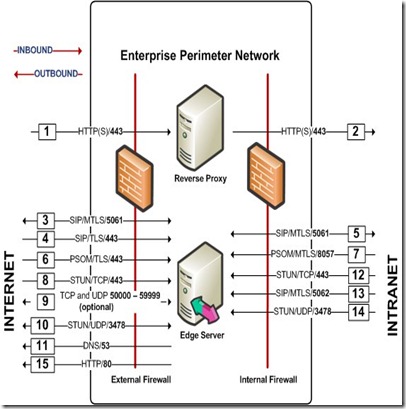OCS 2007 R2 Edge server configuration (Part III) (Port Requirements)
Ports and protocols used by Office Communications Servers and clients -
https://technet.microsoft.com/en-us/library/dd425238(office.13).aspx
Taken from the link Firewall Requirements for External User Access https://technet.microsoft.com/en-gb/library/dd441361(office.13).aspx
- IPsec Exceptions - https://technet.microsoft.com/en-us/library/dd425136(office.13).aspx
- Media Ports
Media Port Range for Office Communications Server 2007 R2
Office Communicator |
1024-65535 |
UDP/TCP |
Port range used for inbound and outbound media transfer through the external firewall. |
Office Communicator |
6891-6901 |
TCP |
Port ranged used by Office Communicator for file transfer. |
Live Meeting 2007 client |
1024-65535 |
UDP/TCP |
The port range used for inbound and outbound media transfer through the external firewall. |
Live Meeting 2007 client |
6891-6901 |
TCP |
The port range used by Live Meeting for file transfer. |
Media Transfer: UDP/TCP 1024-65535 are the protocols and port ranged for voice or audio media transfer used once a call or conference has been established. So this range is available by default for use with ICE, STUN and TURN for negotiating through a firewall, the ports available on the client side for voice or video communications.
Note: (STUN) Simple Traversal of User Datagram Protocol through Network Address Translators (NATs): is a standards-based IP protocol used as one of the methods of NAT traversal in applications of real-time voice, video, messaging, and other interactive IP communications (RFC 3489)
(TURN) Traversal Using Relay NAT: a protocol allowing elements behind a NAT or firewall to receive incoming data over TCP or UDP connections. (IETF Draft)
(ICE) Internet Connectivity Establishment: a protocol providing a mechanism for NAT or firewall traversal, using various techniques. In particular, it is used to allow SIP-based VoIP clients to successfully traverse the variety of firewalls that may exist between a remote user and a network. (IETF Draft)
File Transfer: TCP 6891-6901 are the protocols and port ranged used solely for the "Send File" function from within Communicator. So if you had an IM session open and wanted to send or transfer a file to a particular user, this is the range available to be negotiated for both sending and receiving ends
